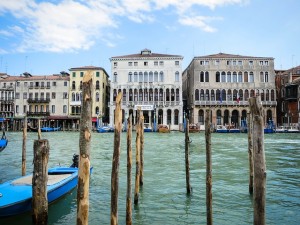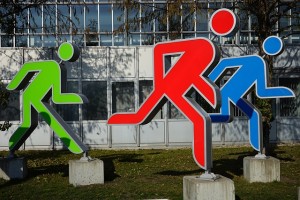that will take some doing, there is a lot of work involved
[Dutch phrase of the week]
[dat heeft heel wat voe-ten in de aar-de] ![]()
 The past few days I spent a lot of time on migrating the blog from dwotd.web-log.nl (which still seems to be unreachable) to www.dwotd.nl. This inspired me to choose ‘dat heeft heel wat voeten in de aarde’ as this week’s phrase 🙂 Literally ‘that has a lot of feet in the earth’ this phrase says that something will be difficult (labour-intensive, but possible) to realize with quite a few hurdles along the way.
The past few days I spent a lot of time on migrating the blog from dwotd.web-log.nl (which still seems to be unreachable) to www.dwotd.nl. This inspired me to choose ‘dat heeft heel wat voeten in de aarde’ as this week’s phrase 🙂 Literally ‘that has a lot of feet in the earth’ this phrase says that something will be difficult (labour-intensive, but possible) to realize with quite a few hurdles along the way.
You may also hear: “Het heeft heel wat voeten in de aarde.”
Examples:
– “Het heeft heel wat voeten in de aarde om met het openbaar vervoer van Amsterdam naar Barendrecht te reizen.”
(“Using public transport to travel from Amsterdam to Barendrecht will take some doing.”)
– “Het maken van spekkoek heeft heel wat voeten in de aarde.”
(“There is a lot of work involved in baking spekkoek.”)
– “Het plannen van een reis naar de maan heeft heel wat voeten in de aarde.”
(“Planning a trip to the moon takes some doing.”)
– “Ik probeer al maanden een bouwvergunning aan te vragen…” – “Tja, in de bureaucratie die Nederland heet, heeft dat heel wat voeten in de aarde!”
(“I have been trying for months to obtain a building/construction permit…” – “Well, in the bureaucracy one calls the Netherlands that will take some doing!” Note that ‘vragen’ means ‘to ask’, but ‘aanvragen’ is ‘to request’. In this case the result of the request is implied hence the translation ‘to obtain’.)
– “Het heeft heel wat voeten in de aarde, maar ik zou graag een DWOTD iPhone app maken.”
(“There is a lot of work involved but I would really like to create a DWOTD iPhone app.”)
– “Mac OS X Lion werkt voor geen meter, ik wil terug naar Snow Leopard maar dat heeft heel wat voeten in de aarde!”
(“Mac OS X Lion doesn’t work at all, I want to revert to Snow Leopard but that will take some doing!” I made the mistake to blindly upgrade to Lion and now I’m left with a cripple iMac!)
Related words:
– Aarde: earth, ground [noun] [de aarde, <no plural>].
– Voet: foot [noun] [de voet, de voeten].


 The earliest version of this saying is “dat staat als een paal”: it’s as firm as a pole in the ground. The current ‘boven water’ version probably has to do with ‘meerpalen’: mooring posts.
The earliest version of this saying is “dat staat als een paal”: it’s as firm as a pole in the ground. The current ‘boven water’ version probably has to do with ‘meerpalen’: mooring posts. A ‘hardloper’ literally translates as ‘somebody who walks fast’; the word is typically used in the context of sports (a ‘runner’ or ‘jogger’). The noun ‘doodloper’ one only encounters in today’s phrase; it’s derived from the verb ‘doodlopen’ which means ‘to lead nowhere, to come to a dead end’. There is also the reflexive verb ‘zich doodlopen’: to walk oneself to death. Both could be applicable here; the phrase ‘hardlopers zijn doodlopers’ says that when you begin too quickly on something, you may not last until the end. It’s also used to say that you shouldn’t rush into things and take your time to do something properly.
A ‘hardloper’ literally translates as ‘somebody who walks fast’; the word is typically used in the context of sports (a ‘runner’ or ‘jogger’). The noun ‘doodloper’ one only encounters in today’s phrase; it’s derived from the verb ‘doodlopen’ which means ‘to lead nowhere, to come to a dead end’. There is also the reflexive verb ‘zich doodlopen’: to walk oneself to death. Both could be applicable here; the phrase ‘hardlopers zijn doodlopers’ says that when you begin too quickly on something, you may not last until the end. It’s also used to say that you shouldn’t rush into things and take your time to do something properly. Literally this phrase says: “You have (a) no, (a) yes you can get”. You use it to say that you can only benefit from trying something because when it fails, you are back to where you were before trying. Depending on the context, it can be translated as ‘nothing ventured, nothing gained’ or along the lines of ‘it doesn’t hurt to ask’.
Literally this phrase says: “You have (a) no, (a) yes you can get”. You use it to say that you can only benefit from trying something because when it fails, you are back to where you were before trying. Depending on the context, it can be translated as ‘nothing ventured, nothing gained’ or along the lines of ‘it doesn’t hurt to ask’.